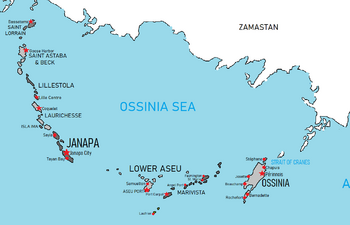Lower Aseu
Republic of Lower Aseu | |
|---|---|
|
Flag | |
 Map of the Northern Cantalle Islands | |
| Capital | Aseu Port |
| Demonym(s) | Aseuan |
| Government | |
| Salma Vargés | |
| Population | |
• 2022 estimate | 2,704,800 |
| Date format | mm-dd-yyyy |
The Republic of Lower Aseu, commonly known as Lower Aseu, Aseu, or the Aseuans, is an archipeligic nation in the Northern Cantalle Islands, located in the northeast Cantalle Ocean and sharing maritime borders with Janapa, Arrey, and Marivista. Its northern coasts lay along the Ossinia Sea. The archipelagic state consists of more than 3,000 islands, cays, and islets. The capital and largest city is Aseu Port, which is also the second-largest city in the Northern Cantalle Islands after Périnnois, Ossinia. Other major settlements on the islands include Samuelton, Port Crow, and Aulemers. Lower Aseu's location along the Hurricane Corridor makes it prone to severe weather.
Lower Aseu was inhabited by indigenous populations for thousands of years with limited interaction with mainland Euronia or Adula, until the islands were colonized by Quetana in 1562. Many of the indigenous people either were killed or died of diseases, after which the Quetanans and later Skithans brought large numbers of Adulan slaves to the islands as laborers. Under colonial rule, Aseu became a leading tobacco exporter, with a plantation economy dependent on the slaves and later their descendants. The islands remained a possession of Skith until 1832, when the aftermath of the Zamastan War of Independence and the Barretoan Wars prompted its abandonment. Brief independence followed, until the restored Quetanan empire waged a campaign to reclaim the islands in 1841. Quetana kept its claim over the islands until the 1910 revolution led it to relinquish control, and in 1911 Lower Aseu officially became an independent republic.
During and immediately after the World War, Zamastan occupied Lower Aseu (1950-1956) due to its government's tolerance towards Drambenburg. Francisco Rabellini was installed by Zamastan as president following occupation, but Rabellini was assassinated in 1961. Manuel Carnicero subsequently took power, but he was deposed in a military coup in 1964. A civil war followed, was ended by Zamastanian military intervention, and was followed by the authoritarian rule of Cesar Ayerbe (1967-1973). The surprise election of Miquel Herrero in 1973, however, signaled a shift toward representative democracy. Since then, elections have been observed by CCA-appointed groups, and the country has emerged as a thriving democracy. The assassination of President Luca Juárez Carbonero in 2000 by Ossinian agents led to increased tensions between Lower Aseu and the government of Martin Saint-Yves, but the WEDA-led intervention in Ossinia in 2020 quelled relations. Salma Vargés became the first woman president elected in 2021. In 2022, Lower Aseu expanded its foreign relations with Euronia when it joined WEDA and TIDI. In September 2023, Hurricane Edith became the costliest natural disaster in the country's history.